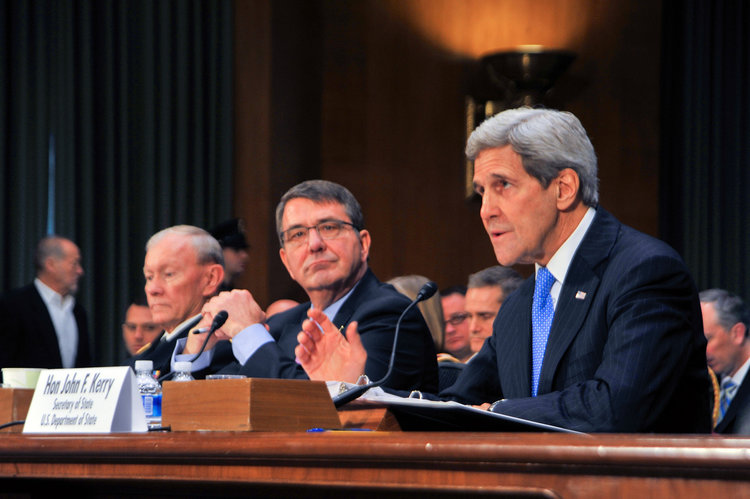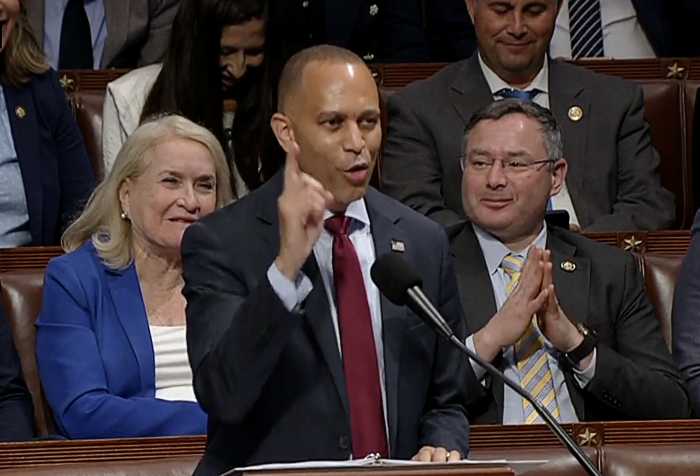Between presumptive Democratic presidential nominee Hillary Clinton’s private email hullabaloo and outrage over 47 Republicans sending Iran a politically-charged letter to undermine its nuclear negotiations with Secretary of State John Kerry, it’d hardly be a surprise if a large chunk of the American public had no idea Congress last week debated President Barack Obama’s authorization for a war he’s already fighting.
The idea that the administration is seeking a new authorization to use military force for its war against the so-called Islamic State, also known as ISIS or ISIL—a conflict that the US has been involved in for more than seven months—may be confusing to some folks. Although the Obama administration whole-heartedly believes it has the necessary authorization to battle the militant group because of previous versions of the AUMF, passed in 2001 and 2002, it still wants Congress to codify a version related to ISIS, so as to ostensibly show the world that the American people—and its policymakers—are united in this effort to “degrade and destroy” ISIS.
Secretary of State John Kerry didn’t even try to conceal the administration’s motives when he testified in front of the Senate Foreign Relations Committee last week.
“The President already has statuary authority to act against ISIL, but a clear and formal expression of your backing would dispel any doubt anywhere that Americans are united in this effort,” Kerry told the Senate committee on March 11.
Obama’s proposed ISIS AUMF, which would remain in effect for three years, is very much a symbolic move. If Congress never passes a new AUMF, the Obama administration would still continue to bomb Iraq and Syria, and support local forces on the battlefield, the Iraqi military and its allied militias.
The administration has repeatedly invoked the 2001 AUMF, passed three days after the Sept. 11 attacks, which allowed the US to fight those who orchestrated the attacks—meaning al Qaeda—to justify the war on ISIS. It’s also relying on the 2002 AUMF, which opened the door for President George W. Bush to “defend the national security of the United States against the continuing threat posed by Iraq.”
The 2001 AUMF, in particular, has been criticized as too broad. Originally, it was intended to justify war with al Qaeda, which ISIS was born out of but is no longer associated with. A new AUMF would sunset the 2002 version while the authorization passed shortly after 9/11 would remain on the books.
After months of publicly calling on Congress to act, Obama finally moved ahead in February and sent a draft letter to Congress outlining the ISIS AUMF. This version would allow the US to fight ISIS and any “associated forces” partnering with the group or any “closely-related successor entity.” It does not establish any geographical boundaries, nor does it fully prevent the use of ground troops, such as Special Forces.
In his testimony last week, Kerry didn’t necessarily rule out sending American ground troops. He said the “administration sees no need for U.S. forces to engage in enduring offensive ground combat operations against ISIL,” adding that the responsibility for such fighting fell on “local partners.” At the committee hearing, neither he nor Secretary of Defense Ashton Carter eliminated the possibility of expanding the current operation outside of Iraq and what’s left of Syria. ISIS, which has brutally slaughtered innocents, including American journalists, and claimed large swaths of the region rather quickly as it strives to create its so-called new caliphate, is now known to be fighting in Libya, which has struggled to find stability after Colonel Muammar Gaddafi fell from power in 2011.
“The proposed AUMF wisely does not include any geographical restriction because ISIL already shows signs of metastasizing outside of Syria and Iraq,” Carter told committee members.
Kerry, for his part, acknowledged that the AUMF sets no geographic limitations but said the administration does not “anticipate conducting operations against targets in countries other than Iraq and Syria at this time.”
The administration may have a difficult time persuading Congress to pass a new AUMF, despite Obama’s calls for American unity and, as Kerry put it, to speak with a “singular voice.”
Some Congressional Democrats have expressed concerns about the lack of limitations—both geographically and with respect to the future use of ground troops—while several Republicans on Capitol Hill believe the AUMF may handcuff the military.
Considering that both Kerry and Carter have admitted that the administration already believes it has the authority to fight ISIS, Congress may not feel the urgency to give Obama the authorization he’s requesting.
Time will tell if Congress eventually passes a new AUMF. But in the meantime, the war will go on—with or without Congressional authorization—continuing the “War On Terror,” the longest conflict in U.S. military history, and the costliest.
































